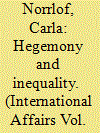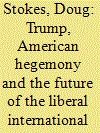|
|
|
Sort Order |
|
|
|
Items / Page
|
|
|
|
|
|
|
| Srl | Item |
| 1 |
ID:
159467


|
|
|
|
|
| Summary/Abstract |
A pivotal question raised in the 1980s debate over the durability of the United States-led world order still haunts us today. Does the postwar liberal international order, which the US was central in shaping, serve US interests? President Trump's answer is a resounding no, promising an ambitious redistributive programme to rebalance global wealth and power. Similar to political platforms in other advanced countries, Trump argues for a fundamental revision of the order, proposing a renewal of international principles to foster a global system tailored to US interests. The major theatres where this battle is being fought are the politics of security, trade and money. Prominent academics align on some aspects of this agenda. Instead, I contend that as the primary beneficiary of the liberal international order, the US will be its first casualty. While President Trump is right to identify the potential role redistribution could play in strengthening America's global leadership, he misidentifies the nature of the distribution problem. Internationally, ‘America First’ is premised on zero-sum logic and poses a risk to the liberal international order, to US security and prosperity. Domestically, ‘white America First’ promises to restore lost greatness to white Americans, aggravating economic and political inequality in the US. Drawing on presidential exit polls, other survey data, real income and income growth nationally and regionally, I explain the 2016 election outcome as a function of education and ethnicity, contextualized by income concerns and racism. Redistributive domestic policies, particularly expanding higher education, are necessary for US support of the liberal international order to endure.
|
|
|
|
|
|
|
|
|
|
|
|
|
|
|
|
| 2 |
ID:
159470


|
|
|
|
|
| Summary/Abstract |
Through its ambivalence towards its global security alliances, abrogation of free trade treaties and questioning of globalization, the Trump administration has argued that the United States-led liberal international order is too burdensome. How accurate is this portrayal? Drawing on theories of hegemonic leadership, the paper argues that the US national interest became globalized in the postwar international system and the US-led liberal order has given it enormous positional advantages. These include the capacity to shape the international preferences of other states, externalize domestic economic crises and construct the kind of international economy it wanted. Despite growing international competition, the US still has essentially the same global interests. However, neo-liberal globalization has weakened the domestic consent for American leadership among large sections of the American working class, who have rationally rejected continued US commitment to a system that has deepened economic inequality in the US. Trump has ridden the wave of this discontent, and although US elites may wish to return to the status quo after President Trump, these structural issues will remain. Trump may well do irreparable damage to the liberal order and thus, more broadly, to the West. While imperfect, the liberal order is still the ‘best of a bad bunch’ in terms of forms of systemic order on offer, and if the luxury of choice remains after Trump, a new domestic and international social contract is needed to revive US global leadership.
|
|
|
|
|
|
|
|
|
|
|
|
|
|
|
|
|
|
|
|
|